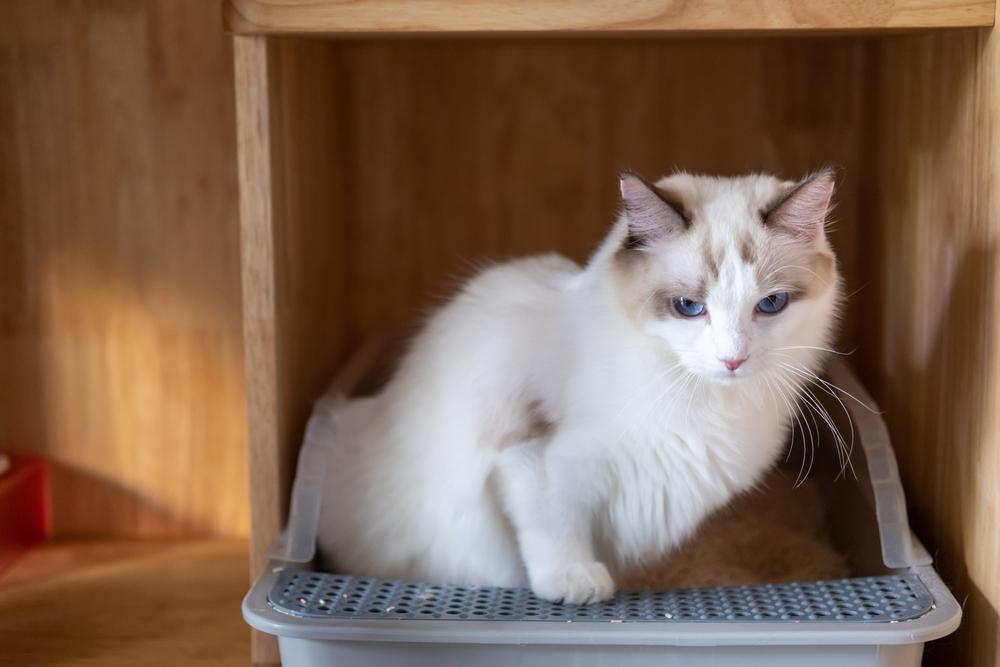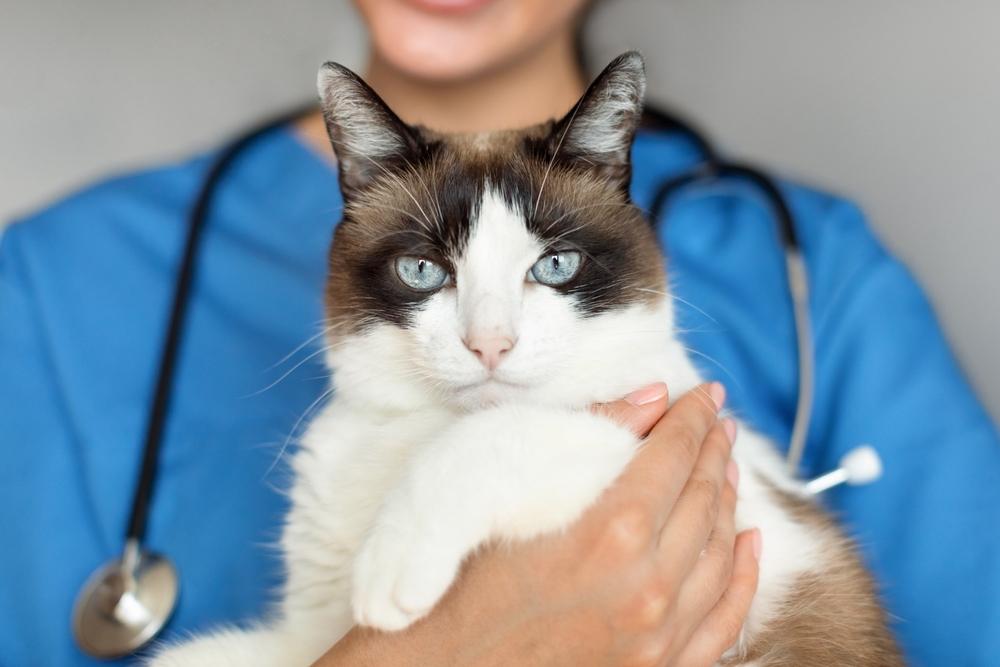

While life with your cat is often all sunshine and rainbows, sometimes you have to confront unpleasant situations to provide the highest level of care. For example? Poop. Your cat's stool can tell you a lot about their health, specifically their gut health. As a cat parent, it's important to know what healthy cat poop looks like for your kitty, as well as what to do if you notice any changes in cat poop color or other characteristics.
Any change in stool quality — such as cat poop color, consistency, frequency or the presence of foreign material — can be an indicator of an underlying health concern in cats. Here's what you should know to help keep your cat healthy and happy.
What Does Your Cat's Poop Say About Their Health?
While it may sound unpleasant to observe your cat's poop, litter box contents can tell you a lot about their health. Stool quality can give you information about many things, such as hydration levels, the presence of intestinal parasites or imbalances in the gut microbiome.
The gut microbiome is a vast and diverse community of trillions of microorganisms, including bacteria, viruses, fungi and other microorganisms, that reside in the digestive tract. These microorganisms play an integral role in maintaining your cat's health, supporting digestion, vitamin synthesis, immune system health and organ function. A balanced gut microbiome helps protect against harmful microbes, while an imbalanced gut microbiome — known as dysbiosis — has been linked to conditions such as obesity, gastrointestinal (GI) disease, diabetes and allergies.
If you notice abnormalities in your cat's stool or litter box habits, reach out to your veterinarian. They can help identify the underlying issue and recommend next steps.

Before you can look for abnormalities, you need to know what normal cat poop looks like. Healthy cat poop is well-formed, log-shaped and firm but moist (not too soft, not too hard). It should be light to dark brown in color.
You can get a good idea of what's normal for your cat by observing their poop when you scoop the litter box each day. Over time, you'll be able to recognize changes in their stool quality. If you aren't sure what's normal for your cat or have any concerns about their habits, consult your vet.
Stool Characteristics: What's Not Normal for Cat Poop?
Monitoring your cat's stool regularly can help you catch any underlying health issues early when they're more minor and easier to treat. The primary cat poop characteristics to note include color, consistency, shape/size, contents, frequency and smell.
Color
Normal, healthy cat poop is typically brown in color, though the exact shade of brown can vary based on the color of your cat's food. Different colors or variations can be signs of something unusual going on internally.
What if Your Cat's Poop Is Yellow?
If your cat's food is yellow or orange, their poop may have a yellowish hue. However, pronounced or unusually yellow cat poop may be a sign of liver disease or digestive issues or infections.
What if Your Cat's Poop Is White?
White, gray or pale cat poop can indicate gallbladder, liver or pancreatic disease. It can also occur with certain medications or from eating bone meal. Greasy-looking cat poop can be a sign of issues with the gallbladder, liver, pancreas or upper GI tract as well.
What if Your Cat's Poop Is Green?
Green cat poop can indicate gut or gallbladder inflammation or infection. Greenish poop may also be caused by eating grass or green-colored food.
What if Your Cat's Poop Is Red — Is It Bloody Cat Poop?
Fresh blood in the stool, appearing as streaks of red blood or red-colored mucus, can indicate issues in the lower GI tract.
What if Your Cat's Poop Is Black?
Black stool can indicate digested blood from an issue in the upper GI tract. Digested blood may appear as tarry stool, black mucus or a substance resembling coffee grounds.
Consistency
Normal stool should be well-formed and firm yet pliable. Stiff, hard stool may indicate dehydration or constipation, while soft stool or diarrhea can indicate inflammation in the gut or other health conditions.
Shape/Size
Healthy cat poop should be shaped like a sausage, segmented and leave little-to-no residue when scooped from the litter box. Small, hard pellets that look like rabbit poop can indicate constipation or dehydration. Soft stool that leaves residue when scooped from the litter box or watery stool (diarrhea) is generally considered abnormal and may indicate digestive issues.
Contents
Normal cat poop shouldn't contain anything unusual. The following contents warrant your (and your vet's) attention:
White segments resembling grains of rice, indicating intestinal parasites
Excess hair, indicating excessive grooming or shedding
Foreign items such as rocks, dirt, bits of toys or hair ties, indicating your cat is eating things they shouldn't
Frequency
Most cats defecate once or twice a day (some cats may defecate every other day), often after eating a meal. This can change as cats age. More frequent trips to the litter box with small amounts of diarrhea can be a sign of colon irritation or inflammation. More frequent trips to the litter box with large amounts of soft stool or liquid diarrhea can indicate an issue with the small intestine. Straining or spending more time in the litter box while only producing small amounts of hard stool is a sign of constipation.
Smell
Healthy cat poop has a mild odor — it shouldn't be overwhelmingly pungent. Unusually strong-smelling stool can be a sign of a bacterial infection, inflammation, gut microbiome imbalance or even bleeding in the GI tract.

When to Call the Vet
As a general rule, call your vet if you notice any change in the color, consistency, frequency, contents or smell of your cat's poop. Here are some more specific indicators that it's time to consult your vet:
Straining in the litter box
Severe, bloody or tarry diarrhea
Soft stool lasting more than 24 hours
Small, hard pellets of poop
Stool with visible worms or rice-like "grains"
Unusually colored stool for more than 24 hours
Any new color change to the stool
Vomiting
Lack of appetite
Weight loss
If your cat has a history of GI disease or any other health concerns, contact your vet about any abnormalities in stool quality or habits.
Supporting Your Cat's GI Health
While you can't control your cat's GI health, you can take steps to reduce their risk of GI problems and support healthy stool quality. Feed them a complete and balanced food appropriate for their life stage, and ensure they're getting the appropriate amount to support a healthy weight. Your vet can point you toward a suitable meal plan for your cat's needs. They may recommend a formula with prebiotic fiber to support GI health. Introduce new food gradually over a period of at least a week — some cats may need several weeks to adjust.
Additionally, take your cat in for regular veterinary exams at least once a year. Bring in a fresh stool sample so your vet can have their stool tested for parasites, and ensure you're keeping up with deworming preventives or treatments if needed. At home, scoop the litter box daily and keep an eye on its contents. While monitoring your cat's litter box isn't exactly glamorous, it's arguably one of the easiest ways to keep an eye on their health.






















